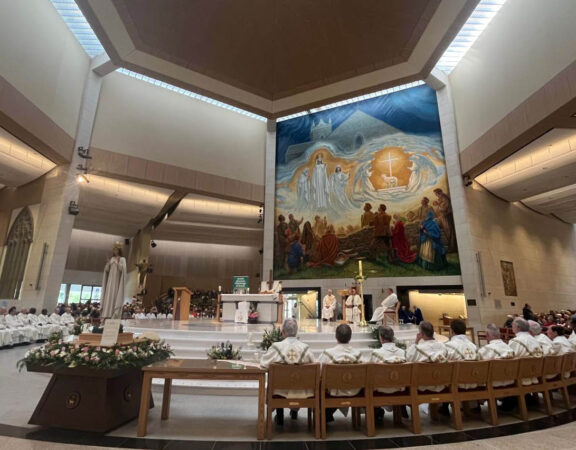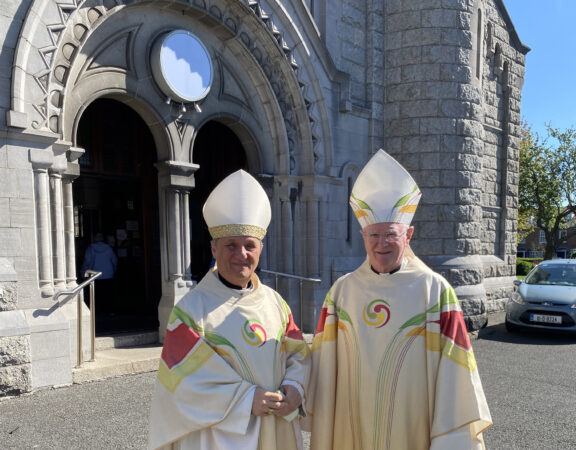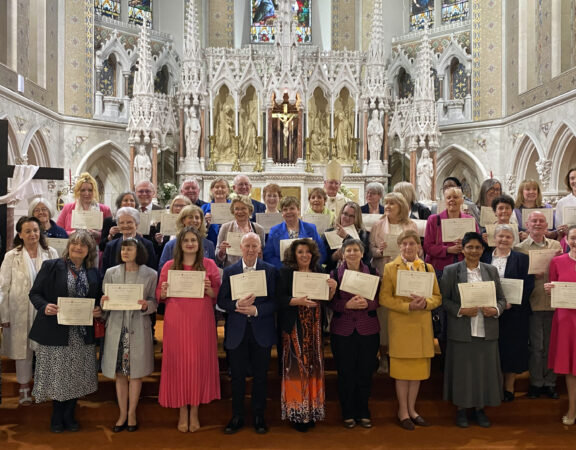by Bishop Eamonn Walsh, Auxiliary Bishop of Dublin at Church of Ireland, Kilternan Parish Church
The unconditional love of God for each one of us is difficult to comprehend, particularly as we mostly experience love that has unspoken conditions attached to it.
Tolstoy speaks of the Russian King who sought to learn about the Christian God. He enquired from the priests and the learned to explain, but it was a shepherd who explained best. When the King asked him about his God, he responded, I will tell you but to do so you must first put on my clothes, and I will put on yours. The king reluctantly put on the earthly animal-smelling shepherds clothes, exchanging them for his delicately perfumed silken robes. Then the shepherd explained, ‘that is what my God did, he came on earth as one of us, put on our human condition with its limitations, suffering and eventual death, at the hands of those, who were the subjects of his creation. When he was taking his leave of us, he gave us his own clothes’; the capacity to live and love as he does is through the gifts of the Holy Spirit. We became temples of the Holy Spirit which means that we have the privilege of bringing God with us everywhere. All of Holy Week is contained in that illustration.
This evening the focus is on Jesus’ example of discipleship and service in washing feet, in the context of Christ’s institution of the Eucharist.
“Whoever welcomes the one I send, welcomes me, whoever welcomes me welcomes the one who sent me” John 13.v20.
Christ as God and man spent much time in prayer with the Father, in teaching, and caring for everyone as brother and sister. The washing of the feet merely illustrated in ritual what he had been doing for the crippled, lame, blind, lepers, rejects, sinners, followers, people of prayer – everyone. In giving himself fully to reaching out in love to people, he proclaimed a new way of being holy, which threatened too many people’s way of religion so they plotted to be rid of him.
“Jesus knew the Father had put everything into his hands, and that he had come from God and was returning to God”.
The depth of God’s love for us was put to the test at the betrayal, the trial and crucifixion. We are familiar with the horrific pain this sacrifice demanded. This sacrifice removed the wall separating us from God. The barrier was removed. The possibility of full friendship with God was restored. The door to God’s friendship was unlocked.
Today, sin, is perceived as an old-fashioned word. It is the temporary and long-term rejection or abandonment of God. Sin on earth is the abandonment of God in person or in the person of another. Each time we reject one another we are sinning.
The washing of the feet is opposite to rejection. It is accepting people. The way of Christ is sacrifice and love in service, the opposite to sin. The way to God is the same kind of service symbolised in the washing of feet.
Acceptance of people, companionship with them in their struggles in life, is the service that Christ offered as an alternative to the barrier, the distancing, the separation, and the way of sin. Communion with each other and with God is the opposite of sin. It is an ultimate in service of another, to put your life on the line for them –a service that repaired the broken friendship between God and the people on earth.
The path of service is the secret to repairing the damage that we experience. No one is beyond repair or the need for repair. Service can be peace making. It can be enabling those through illness, the ageing process, injury or disability, to catch up and attain a better quality of life. It may be listening and caring for someone who’s light of hope in life is dimmed or darkened. Service is sharing our time, talents and resources out of a conscious love for each other as fellow members of God’s family.
Service may not be the most financially productive use of our time. It may involve fairness instead of sharp practice; compassion instead of taking advantage or being hard-nosed. It may involve helping someone up off the ground rather than contempt for them in their fall from grace.Service can be sharing faith together. To pray with someone is service, so too is praying for one another.Service becomes an attitude to life, to people and to opportunities. It is giving and receiving. It is only when the seed dies and allows itself to be at the service of the earth, that it begins to produce new life and a tree much greater than itself.
Service gives personal growth and life to others. An example is the L’Arche movement built on the seed of self-giving.Jean Vanier distinguishes between the service of competence and the service of accompaniment. We can serve someone who has a toothache or is hungry by giving them professional service to relieve their pain. Then there is the service of someone whose pain is loss through death, rejection, shame and fear, feeling lonely and unwanted. Being a companion to each other in that kind of suffering is a service of companionship, a service of compassion. That is the depth of service that Jesus call us to.
Mary gave that service at the foot of the cross. She did not run away when he was spat upon, jeered, disfigured, totally rejected. As Church we are asked to mother to each other in our suffering. It is quite a challenge.Part of the Christian service is to heal the damage that we, or others, continue to do to each other.If we treat anyone as second class then we separate them from us. We can so easily do this in the language we use, the way we tell a story, or in the doors that we close in their face. Once we take our eyes of the dignity of each person; as someone made in the image of God, then it becomes easier for us to treat them as a category and not as some mother’s son or daughter. De-personalising anyone is the first step away from being instruments of God’s love and service. The ‘monster’ language whether in conversation or the tabloids, contributes to the erosion of respect that is owed to everyone regardless of their deeds. This is tough love; it’s the language of Stephen as he was being stoned to death; it is the language of Jesus to his executioners and his companions in crucifixion. The service of respect is an attitude of mind, a way of seeing people. It is not a slogan – it’s a way of life that we aim towards.
In this time of cutbacks on essential services there is an opportunity for us all to use our creativity, imagination and time to fill the gaps with professional volunteers. There are many volunteers who can be trained to provide a professional standard of care. There are professionals who may decide to give of their skills in a voluntary capacity. Every community resource need not involve prohibitive costs. Trained volunteers can do so much; we already experience this invaluable service every day in voluntary and sporting organisations.
When service is translated it reads “I am my brothers and sisters keeper” and that at some stage in life I can make the time to do voluntary work at a professional level that will assist the more vulnerable.The asylum walls have come down but many have become homeless or part of the prison population. We are all part of the solution. Ownership of the challenge is the attitude of mind which will make the difference.People who have time for people are a great resource and are central to what Jesus has asked us to become. At the height of the economic boom the phrase was coined that we had become ‘time poor’. Everyone was so busy that ‘spending time with people had become a luxury item’.
Alongside the ‘time poor’ ears was the belief that there is a pill to cure every ill. So stress, worry, loneliness, had medication based solutions instead of providing people to listen and genuinely care. We have not made it easier for each other through a culture of independent living, security gates and coded apartment blocks. Everyone is born vulnerable and will grow old vulnerable and many times in between.
I have the greatest respect for the nursing staff especially in psychiatric institutions. They work in the most trying and sometimes dangerous situations. I have seen patients becoming human rocking chairs and walking around in slipper shuffle. I have experienced the same patients, accompanied by volunteers in a different environment, with reduced supervised medication, live fulfilling lives out and about in the community.
We are called to be church-living people, not just church-going people. In Christ the ritual and life were the one. We are forever struggling to match the two.Christ’s work will be completed only when we reflect Christ’s love perfectly; then there would be no more sin; just Christian love; heaven on earth; the completion of our prayer – “Thy will be done on earth as it is in Heaven”







